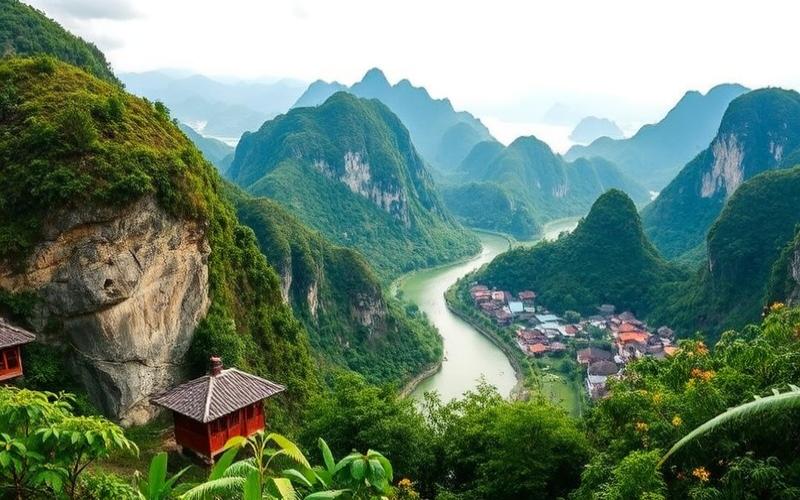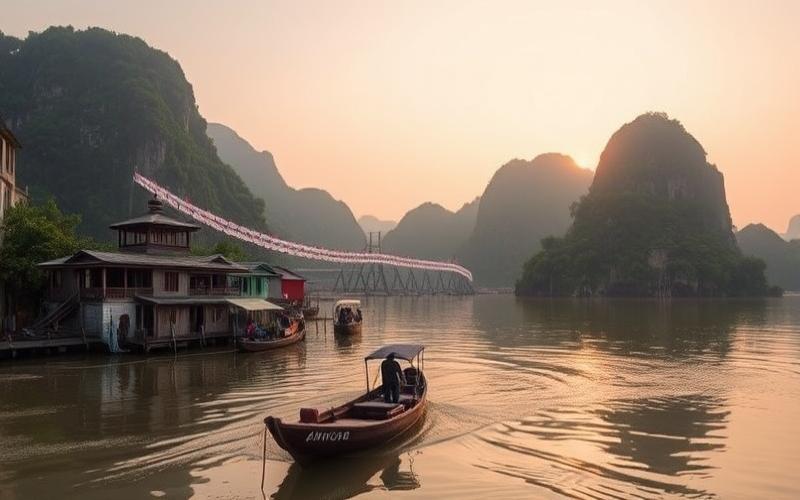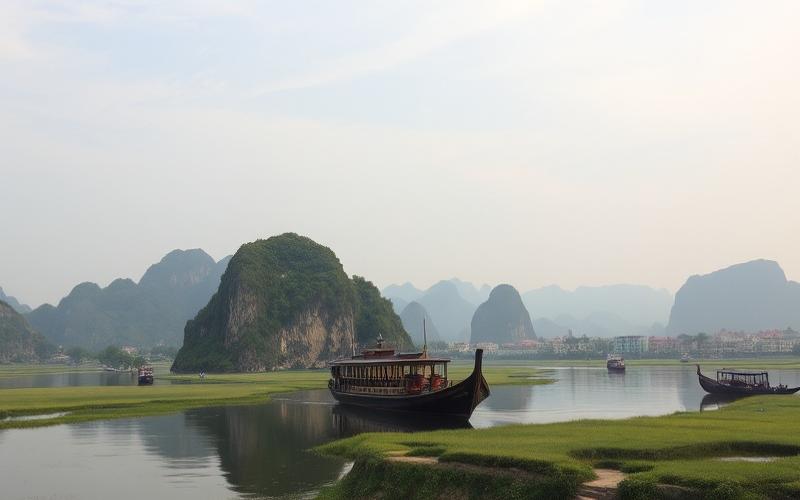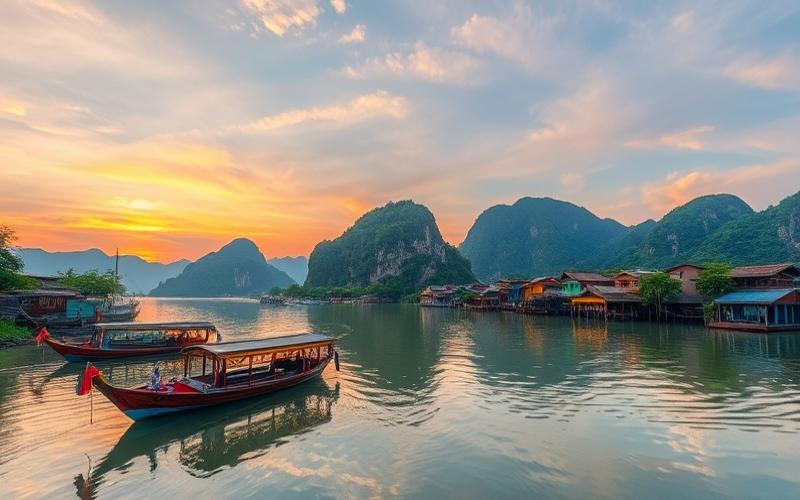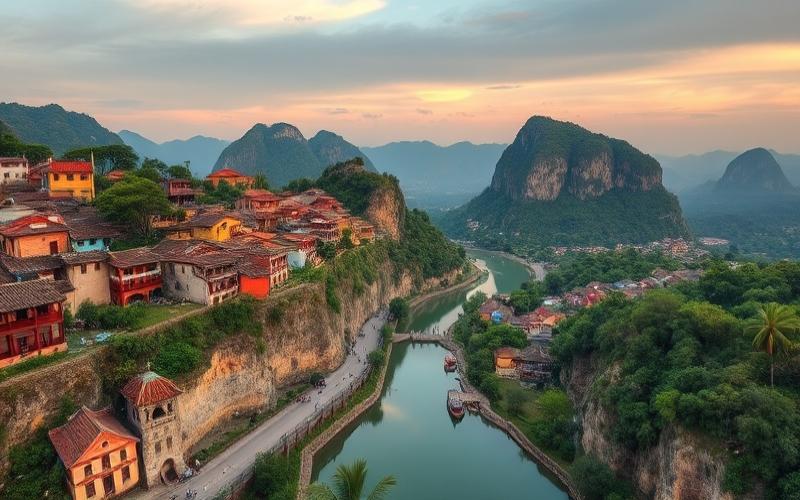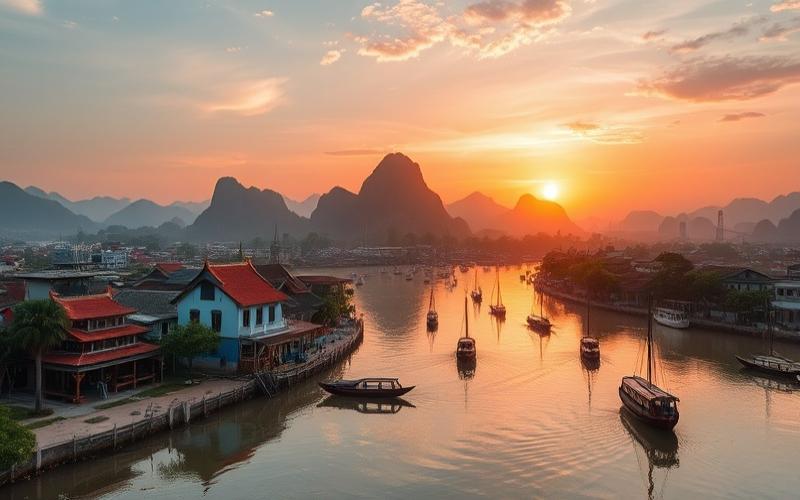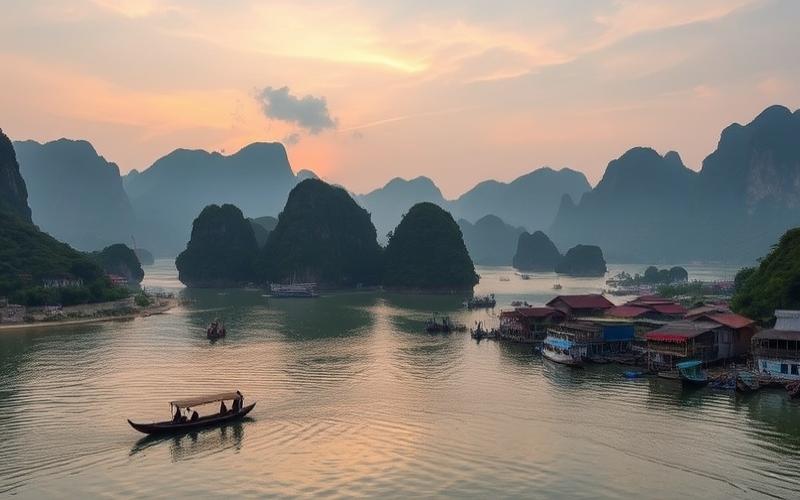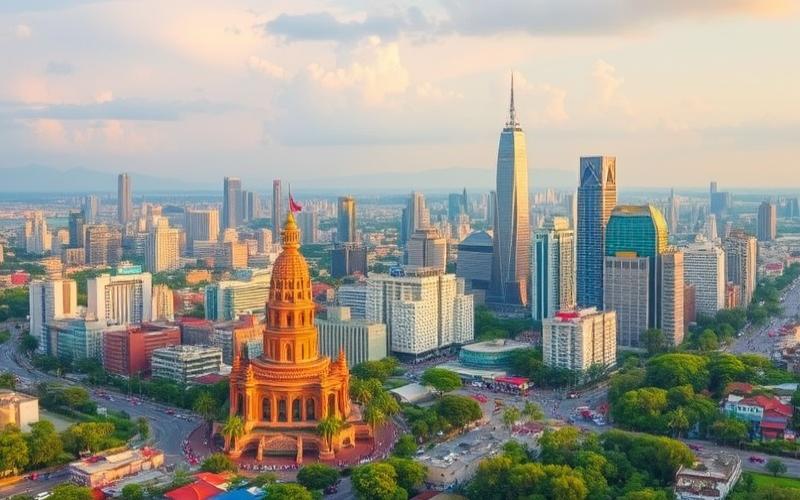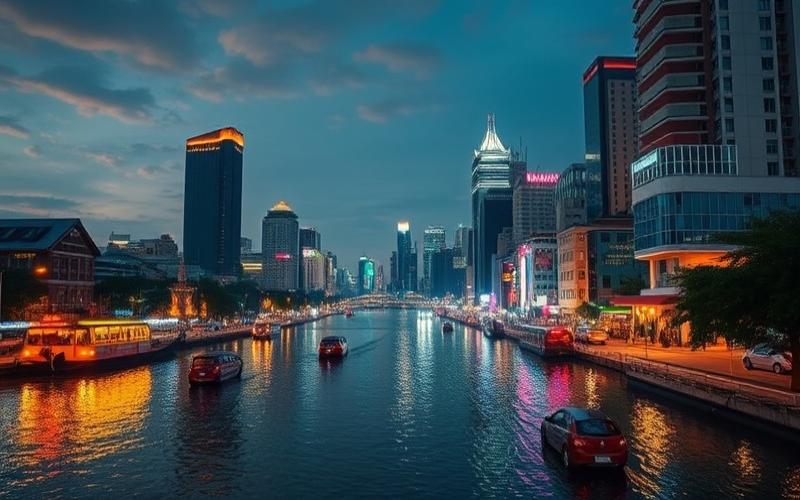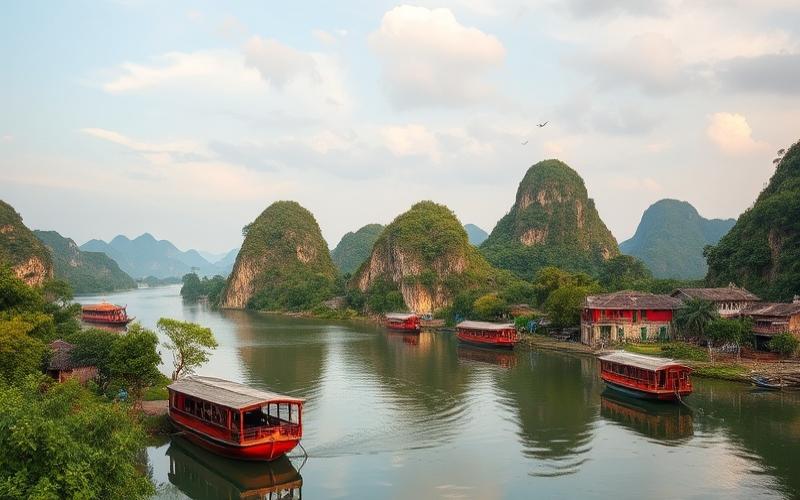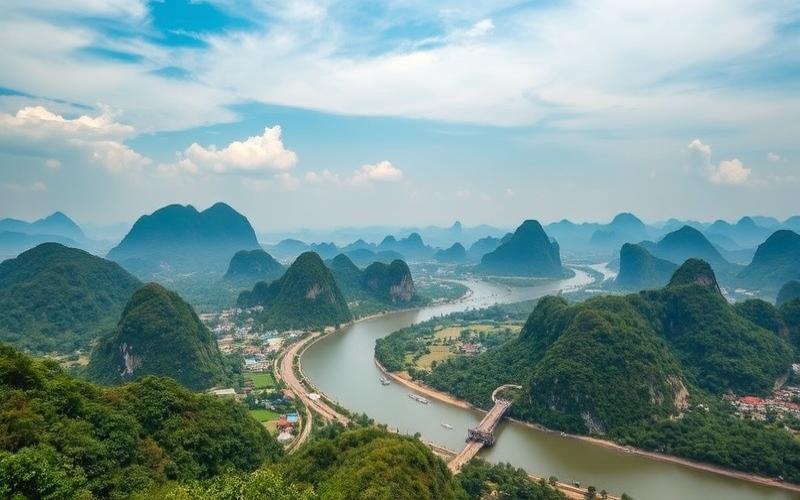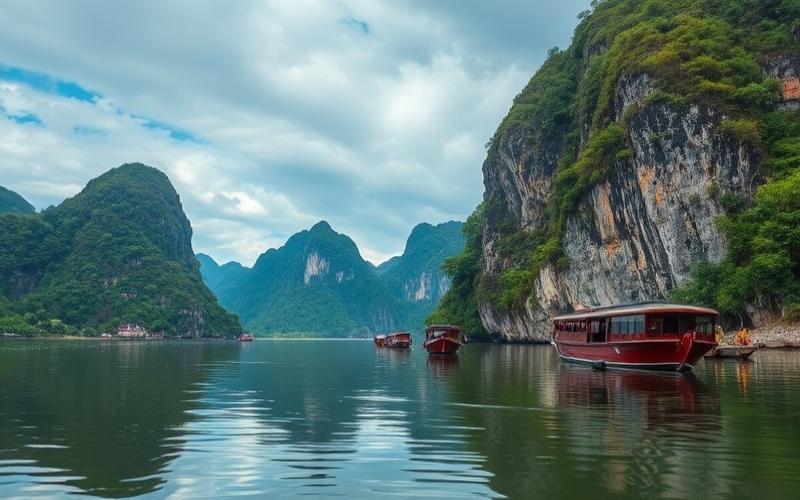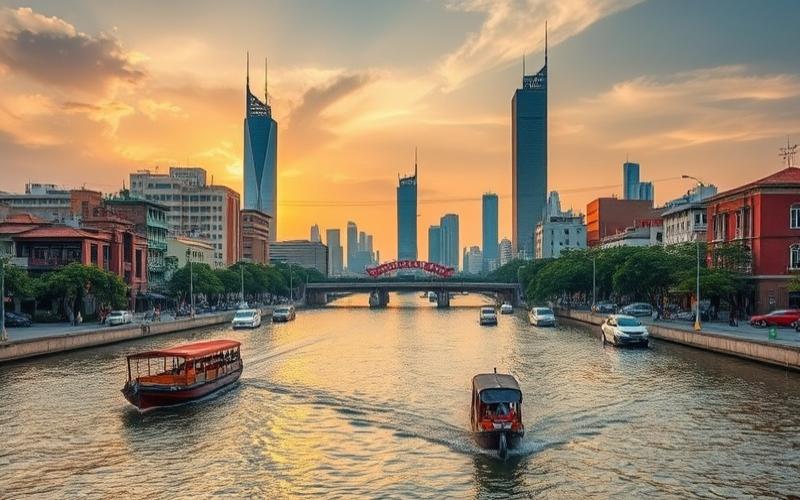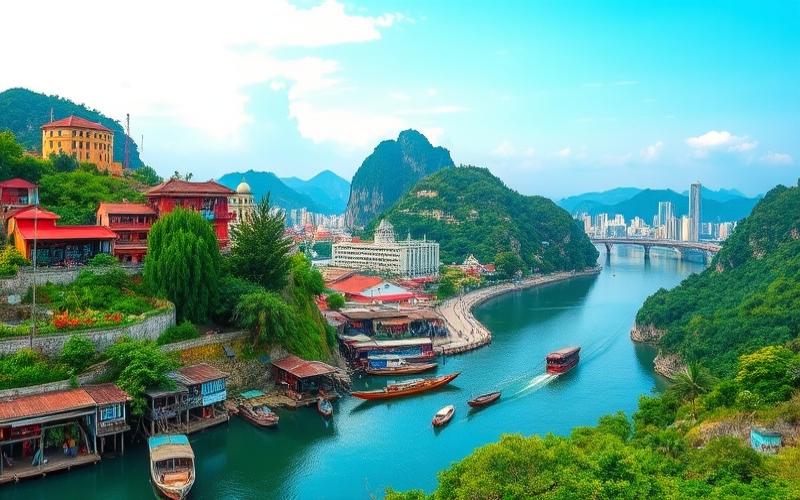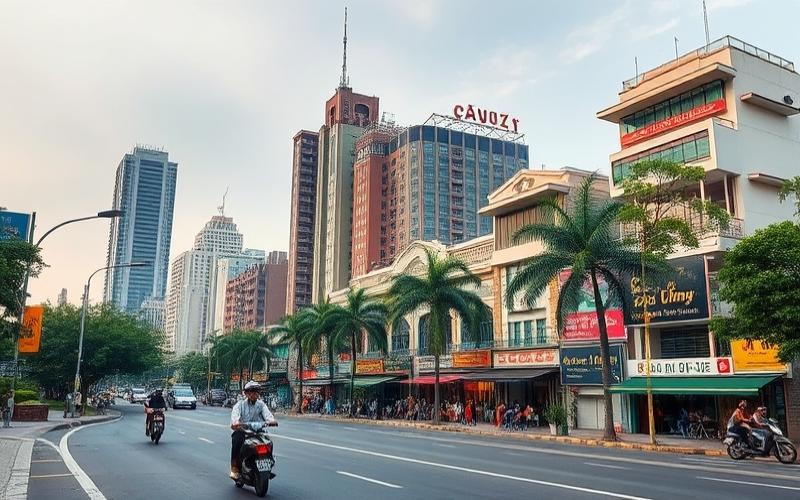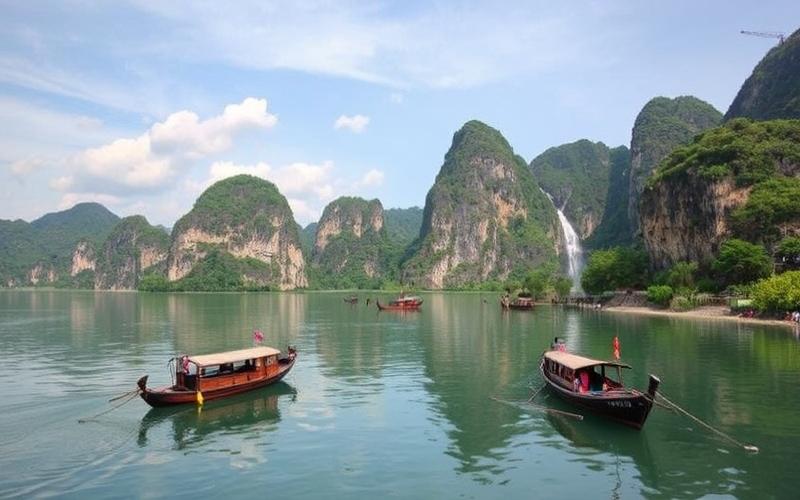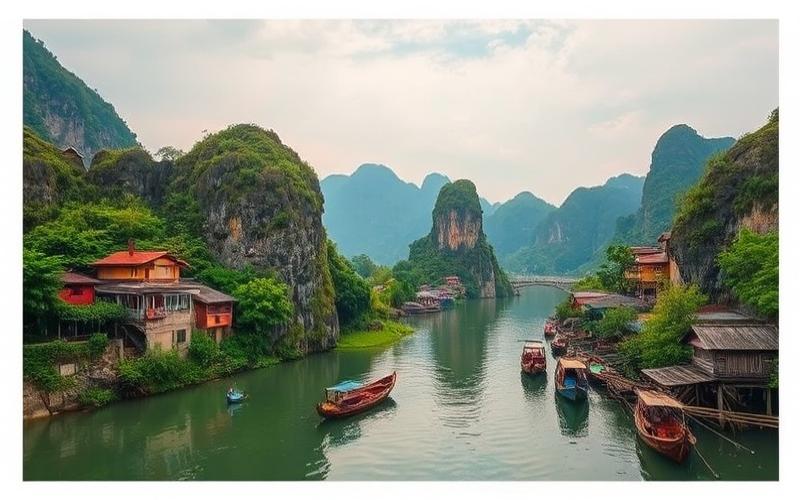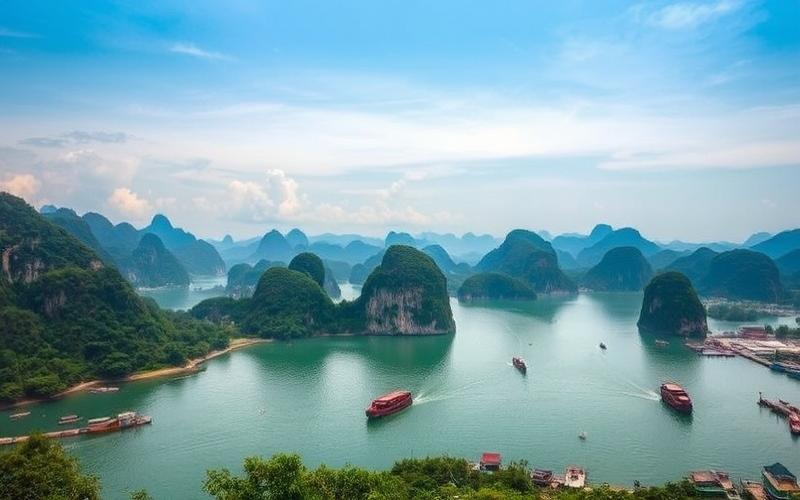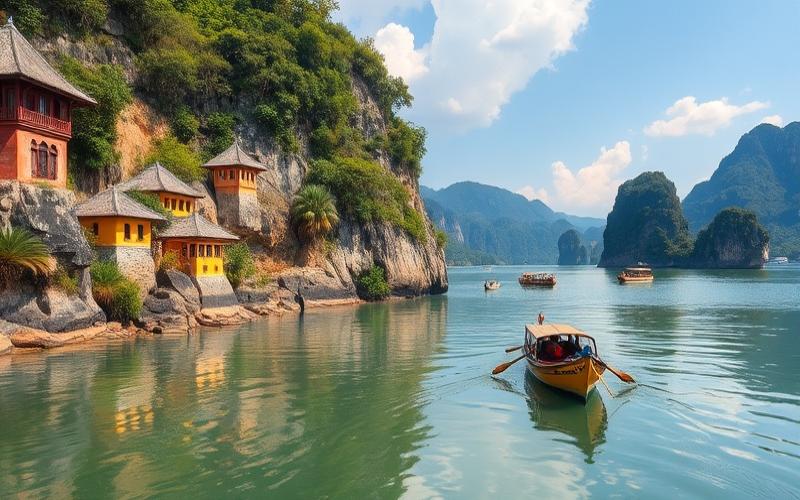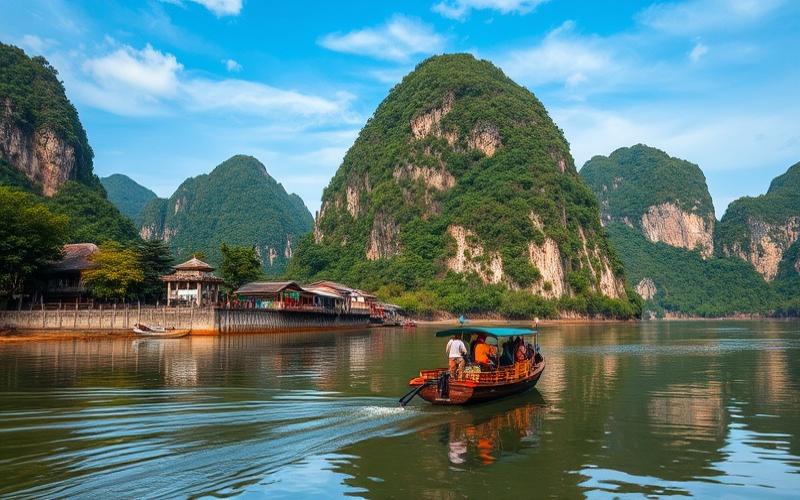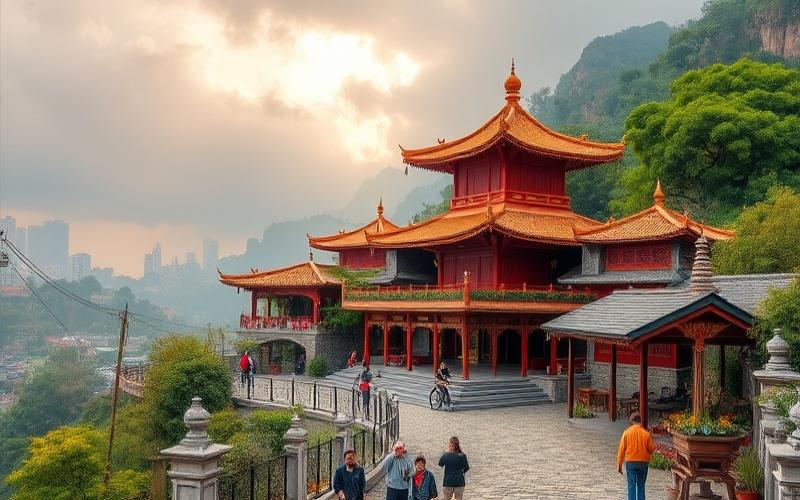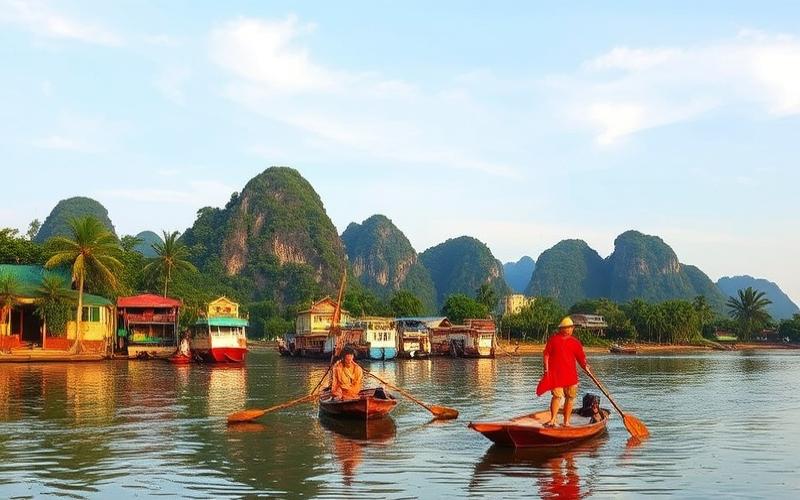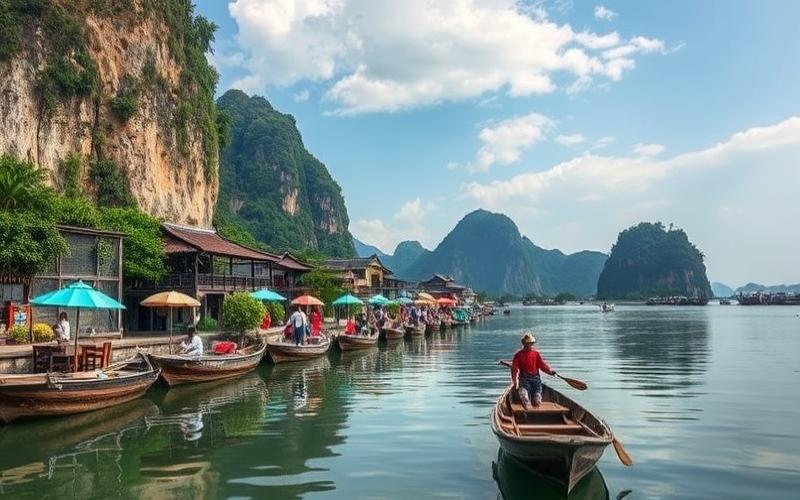
 Published on and written by Cyril Jarnias
Published on and written by Cyril Jarnias
With its captivating blend of ancient traditions and flourishing modernity, Vietnam emerges as a sought-after destination for seniors seeking to enjoy their retirement in an exotic and dynamic setting. Between its breathtaking landscapes, rich culture, and affordable cost of living, this booming country offers countless investment opportunities that combine the pleasures of discovery with financial security. Whether in the heart of Ho Chi Minh City’s vibrancy or the tranquility of the Vietnamese countryside, each location holds unique charms, ready to captivate those aspiring to experience an unforgettable retirement.
Investing in Real Estate in Vietnam: A Smart Choice for European Retirees
Favorable Economic Aspects:
- Real Estate Cost: Real estate prices in Vietnam remain significantly lower than those in Western Europe. For example, purchasing an apartment in Hanoi or Ho Chi Minh City starts from €60,000 to €120,000 for comparable sizes, whereas in Europe, prices are often two to three times higher for equivalent quality.
- Growth Opportunities: The Vietnamese real estate market is expanding rapidly, driven by annual economic growth exceeding 8%, rapid urbanization, and strong local demand. Rental yields in some urban areas reach 6-7%, competing with top European cities.
| City | Average 2-Bedroom Price (EUR) | Rental Yield (%) |
|---|---|---|
| Hanoi | 65,000 – 120,000 | 6.5 – 7 |
| Ho Chi Minh City | 70,000 – 130,000 | 6 – 7 |
| Paris | 350,000 – 500,000 | 3 – 4 |
| Lisbon | 230,000 – 300,000 | 4 – 5 |
Tax and Regulatory Benefits for Foreign Investors:
- Recent reforms facilitate property access for foreigners: it’s possible to purchase apartments with full ownership rights for a renewable 50-year term, and investors can rent out their property to generate income.
- Property taxes and rental income taxes are generally lower than in most European countries.
- Some local schemes offer tax reductions or partial property tax exemptions for retirees settling in Vietnam.
- Administrative procedures for purchase or long-term rental are simplified, especially in major cities and for new residences.
Investment Options:
- Apartment Purchase (new or pre-owned), often in condominiums, with options for seasonal or long-term rental.
- Single-Family Home Purchase (less common and often in suburban areas of major cities).
- Long-Term Rental (1 to 10-year contracts): preferred solution for those wanting to test the market before buying or avoid acquisition formalities.
Attractive Quality of Life:
- Pleasant tropical climate year-round, with very mild winters in most of the country.
- Rich Vietnamese culture: cuisine, crafts, festivals, warm welcome from the local population.
- Affordable healthcare: modern hospital systems in major cities, cost of consultations and treatments much lower than in Europe.
- Generally low cost of living: food, transportation, daily services accessible with a European pension.
Testimonials from European Retirees:
“We bought an apartment in Da Nang for one-third the price of a comparable property in Spain. The expatriate community is dynamic, integration is easy, and our monthly expenses have significantly decreased.”
— Claire and Jean, French retirees
“The climate, food, and kindness of the Vietnamese convinced us. We recommend working with a local lawyer to secure the transaction.”
— Markus, German retiree
Challenges and Considerations:
- Land Ownership Limitations: foreigners cannot acquire land with full ownership, only usage rights for apartments or houses in certain real estate projects.
- Evolving Regulations: it’s crucial to stay informed about local laws, as they can change quickly.
- Language Barrier: although English is common in major cities, procedures may require an interpreter or bilingual real estate agent.
- Legal Security: prioritize projects approved by authorities, verify the developer’s reputation, and consult a local legal advisor.
- International Health Insurance recommended for access to the best medical facilities.
Key Takeaways:
Vietnam currently represents an attractive alternative to Europe for real estate investors, particularly retirees, thanks to its competitive prices, sustained growth, and quality of life. However, it remains essential to properly prepare your project, work with local professionals, and thoroughly understand current legislation.
Good to Know:
In Vietnam, the real estate market offers prices significantly lower than in Europe, providing European retirees with attractive investment opportunities, particularly in apartments or houses, while maintaining long-term rental possibilities. Vietnam also presents tax benefits for foreign investors, elements to verify according to legislation in effect at the time of purchase. With an ideal tropical climate and rich culture, combined with affordable healthcare, the country increasingly attracts retirees who testify to their satisfaction and share practical advice, like Henri, a Frenchman who enjoys the tranquility of his Da Nang villa and highlights local hospitality. However, property purchase may come with challenges for foreigners, such as the need to understand specific regulations, the importance of proper support during acquisition, and anticipating exchange rate fluctuations that could affect the investment.
The Best Vietnamese Cities for Senior Expatriates
Essential criteria making a Vietnamese city attractive for senior expatriates include: cost of living, healthcare quality, transportation accessibility, general quality of life, and presence of an expatriate community.
Main Criteria Sought by Expatriate Retirees:
- Affordable cost of living allowing daily comfort with a monthly budget often between €1,000 and €2,000 depending on desired standard.
- Access to modern medical infrastructure and specialized care adapted to age-related needs.
- Efficient public transportation network or ease of getting around the city without major constraints.
- Rich leisure offerings (cultural, sports, or relaxation), pleasant natural environment, and temperate or tropical climate according to preferences.
- Existence of an organized foreign community offering social support, shared activities, and facilitated integration.
Comparative Table: Recommended Main Vietnamese Cities
| City | Specific Assets for Seniors | Climate | Medical Care | Expat Community | Real Estate Opportunities |
|---|---|---|---|---|---|
| Hanoi | Dense cultural life (museums, opera), quiet historic districts; cosmopolitan atmosphere; numerous green spaces around Hoan Kiem Lake | Cooler temperate | Good level in private/international hospitals | Present but more discreet than in the South | Moderate prices outside hyper-center; seasonal rental potential |
| Ho Chi Minh City (Saigon) | Urban dynamism; best medical offerings in the country; high density of European & Asian expatriates; great culinary diversity | Hot tropical year-round | Best hospital facilities in the country | Largest in Vietnam | Attractive premium neighborhoods; high rental yield |
| Da Nang | Renowned clean & safe beaches; recent infrastructure; balanced natural setting mountains/sea; relaxed atmosphere | Mild humid subtropical | Good private hospitals | Growing presence due to foreign investments | Still accessible prices in some beachside neighborhoods. Strong appreciation potential due to tourism development |
| Nha Trang | World-renowned beach resorts; Numerous “senior-friendly” residential complexes; Peaceful setting conducive to active retirement | Hot dry tropical | International private clinics, dedicated senior wellness services | Small Francophone community; easy networking with other foreign retirees | Investment oriented towards second homes; profitability through high seasonal rental during peak tourist season |
Key Highlights by City:
- Hanoi attracts with its cultural richness (traditional performances, major museums), calm lifestyle around large urban lakes, and a less oppressive climate than the south. The real estate market remains accessible outside the historic center.
- Ho Chi Minh City appeals to those wanting premium medical infrastructure and urban vibrancy. The real estate offering is varied – new high-end apartments with enhanced security appreciated by seniors – but remains more expensive than in the north or coastal areas.
- Da Nang, very popular in recent years for its mild climate, clean beaches, and modern urban planning adapted to elderly persons. Real estate still offers good value for money, especially in immediate outskirts.
- Nha Trang particularly suits seaside lovers wanting to alternate beach relaxation with quick access to all daily services. Many residences already offer amenities adapted to specific senior needs.
Real Estate Opportunities & Perspectives
- Purchase possible through long-term leases under strict legal conditions for foreigners (not full ownership).
- Dynamic market particularly in second home/hotel apartment segments.
- Profitability mainly ensured through short-term rental during strong tourist seasons (Da Nang/Nha Trang).
- Upward trend in square meter prices observed for several years, especially in modernized coastal areas.
For each destination mentioned above:
The choice will primarily depend on the desired lifestyle — urban animation vs. coastal calm — but also on the need for specific medical support.
Good to Know:
For senior expatriates considering spending their retirement in Vietnam, Hanoi and Ho Chi Minh City offer a captivating blend of rich culture and accessibility with modern healthcare systems and multiple expatriate communities. However, for a milder climate and coastal ambiance, Da Nang and Nha Trang stand out with their beautiful beaches, growing hospitality sector, and interesting real estate investment opportunities. The cost of living is generally lower than in the West, and transportation access is well-developed, making medical services and leisure activities easily accessible. In Da Nang, the tranquility and growing development make it a preferred location for those seeking a peaceful retirement, while Nha Trang attracts with its beach atmosphere and natural landscapes. In each of these cities, the real estate market presents interesting prospects thanks to still attractive prices, potentially offering good returns for long-term investments.
Cost of Living in Vietnam: An Asset for a Comfortable Retirement
The cost of living in Vietnam is one of the most attractive in Southeast Asia, offering retirees a comfortable lifestyle and high purchasing power, especially compared to countries like Thailand, Malaysia, or Indonesia.
| Expense Category | Vietnam (monthly) | Thailand (monthly) | France (monthly) |
| Housing | €300-600 (furnished apartment, major cities) | €400-800 | €1200-2000 |
| Food | €150-250 (groceries and local meals) | €200-300 | €350-600 |
| Healthcare | €50-120 (private insurance + routine care) | €60-150 | €150-250 |
| Transportation | €20-40 (bus, metro, taxi, scooter) | €30-50 | €60-120 |
| Leisure | €50-100 | €80-120 | €120-200 |
Main Expense Categories in Vietnam:
- Housing:
Renting a furnished apartment in Hanoi or Ho Chi Minh City costs between €300 and €600 per month, with services included (internet, security, cleaning). Monthly utilities are low, around €65. In rural areas or secondary cities, rents can drop below €200, offering an even more economical alternative. - Food:
Local markets and street food allow eating well for less than €5 per meal. Grocery shopping remains affordable, but imported products are more expensive. - Healthcare:
International clinics offer quality services at rates much lower than those in Europe. Suitable private health insurance typically costs between €50 and €120 per month. - Transportation:
City travel is mostly by scooter, bus, or taxi, for a monthly budget of €20-40. Intercity travel (train, plane) is also very affordable. - Leisure:
Outings, sports activities, cinema, excursions: budget €50-100 per month for an active social life.
Advantage for Fixed-Income Retirees:
- With a budget of €1,000 to €1,500 per month, a retiree can live very comfortably, enjoy restaurants, outings, and even home help.
- In comparison, €2,500 to €3,000 would be needed in France for a similar standard of living.
Cost Differences by Region:
| City/Region | Housing (monthly) | Food (monthly) | General Cost of Living |
| Hanoi | €350-600 | €180-250 | Moderate |
| Ho Chi Minh City | €400-650 | €200-250 | High (for the country) |
| Rural/secondary areas | €150-300 | €120-180 | Very affordable |
– Major cities offer more services and comfort, but prices are higher there.
– Rural areas allow significantly reducing expenses, at the cost of fewer medical or leisure infrastructures.
Tax Benefits for Retired Expatriates:
- Vietnam does not tax foreign retirement pensions paid into an account outside the country.
- There is no bilateral tax treaty with France on pensions, but in practice, local taxation remains very light, even non-existent for foreign retirees.
Testimonials and Anecdotes from Senior Expatriates:
- “Here, I can afford full-time housekeeping and eat out several times a week, which was unthinkable in France with my pension.”
- “With a budget of €1200, I live without depriving myself, I travel regularly within the country, and I enjoy a pleasant climate year-round.”
- “Healthcare is quick and quality in international clinics, and costs are much lower than what I used to pay in Europe.”
Vietnam combines low cost of living, service quality, and financial security, making it a preferred choice for a comfortable retirement in Southeast Asia.
Good to Know:
Vietnam offers an attractive cost of living for retirees, often lower than other Southeast Asian countries. Housing is affordable, with rents potentially much lower than those found in Thailand or Malaysia, especially outside major cities like Hanoi and Ho Chi Minh City. Food expenses are reduced, thanks to local markets offering fresh products at competitive prices. Healthcare, while sometimes requiring international insurance, remains cheaper than in many Western countries, and transportation is economical, whether public transit or taxis. Leisure activities, such as dining out or cultural visits, are also very accessible. Retired expatriates sometimes benefit from tax advantages, making this destination even more advantageous. Expatriate testimonials often highlight the possibility of living comfortably on a fixed income, citing rural areas that offer an even more reduced cost of living compared to major metropolitan areas.
Disclaimer: The information provided on this website is for informational purposes only and does not constitute financial, legal, or professional advice. We encourage you to consult qualified experts before making any investment, real estate, or expatriation decisions. Although we strive to maintain up-to-date and accurate information, we do not guarantee the completeness, accuracy, or timeliness of the proposed content. As investment and expatriation involve risks, we disclaim any liability for potential losses or damages arising from the use of this site. Your use of this site confirms your acceptance of these terms and your understanding of the associated risks.




